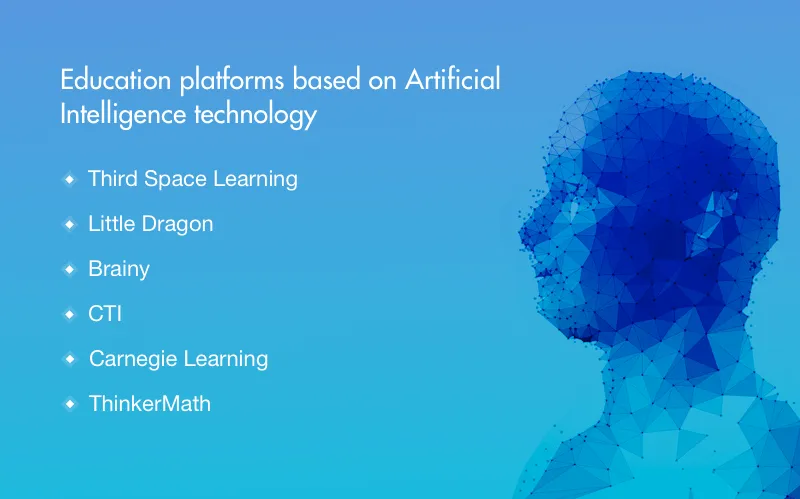AI and Education or How to Create an Advanced Artificial Intelligence Program
Updated 06 Mar 2023
11 Min
7698 Views
An Artificial Intelligence advances day by day. The Clayton Christensen Institute has published a research “Teaching in the Machine Age: How Innovation Can Make Bad Teachers Good and Good Teachers Better”, where the author assures us that Machine Learning improves the quality of work in any sphere, but can a machine replace a teacher?
The recent developments in Artificial Intelligence gave developers an opportunity to teach a computer to perform complicated tasks by their own. The algorithm progresses by self-teaching. That’s how computers imitate people, to some extent, however, we have to admit that the capabilities of Artificial Intelligence in education are still limited. The system can’t substitute professionals, but it can perfect teachers’ skills and education process. Let’s find out what AI programs for education already exist, how students, schools and teachers benefit with it and what we need to know for mobile or web app development using AI technologies for education.
Benefits of Artificial Intelligence in education for students
Let’s look closer at the ways AI can improve the process of education and what benefits gain students, who use the system:

Advantages of AI in education for students
Firstly, educational platform adapts according to the students’ needs. The AI software development system helps scholars work on their weaknesses. During the process, the program discovers where the student has difficulties and sends needed materials to improve his or her skills. The adaptive education uses AI basic algorithm. This algorithm analyzes data, that was received after teacher uploaded training materials into the system and a student did his homework.
Secondly, it is an education at any time. You can study when it’s convenient to you in a real-time mode and get feedback all the time.
Discover how to create a chatbot to increase the productivity and win users' loyalty.
Thirdly, virtual mentors. Now, it’s a point at issue. Teachers all over the world object the automatization of an entire education process, insisting on the idea that we can’t refuse teachers. As they believe, that only a professional can understand all needs of a scholar and only a human can harmonize a training program. Yet, the experience of a ThinkerMath platform that uses Artificial Intelligence latest developments proves the opposite.
Advantages of Artificial Intelligence in education for schools and teachers
There are lots of advantages of usage Artificial Intelligence in schools not only for students, but also for the teachers and schools as well, here are some of them:

The AI program advantages for schools and teachers
Ability to detect weaknesses
The ability to detect weaknesses in various spheres of a training course. For instance, Coursera notifies teachers when the majority of students gave incorrect answer on a question. It shows what material they should concentrate on.
Deep involving into the education process
It can be achieved with an engagement of various computer materials, Virtual Reality technology, gamification and machine knowledge control.
Personalization
The same algorithms allow to detect strengths of a pupil and hidden talents, which he can develop.
Curriculum automatic creation
Development of Artificial Intelligence for education sphere brings one more advantage for school and teachers. Now, they don’t need to create the educational program from scratch and to search for the needed materials. The system processes training materials thusly, improving the effectiveness of a teacher.
Chance to find the best teacher
For example, such system as MyEdMatch applies working principles that are similar to a dating site. They match a school and the most appropriate candidature based on a set of specific criteria, such as teaching experience and soft skills, comparing this information with a school or a class, that need this experience the most.
The use of Artificial Intelligence in education
Is it possible to create Artificial Intelligence? Just like neurone web is a form of Machine Learning, Machine Learning is a form of Artificial Intelligence. But the meaning of AI is vague, so the phrase doesn’t have practical meaning yet. Nevertheless, it doesn't stop us to picture a fantastic technologically advanced future, though the reality is far from that.
Machine Learning is a subdivision of Artificial Intelligence development that uses data analysis algorithm, gets conclusions and makes decisions or predictions. It means, that instead of manual program creation with the help of special instruments, the system is being taught with a large amount of data and algorithms, that give an opportunity to the platform to learn how to fulfil a task.
The AI algorithm educates with the help of technologies Deep Learning or Natural Language generation. In Artificial Intelligence usually algorithms is a small procedure that fulfill a repetitive task.
AI software development is a long and complex task. Yet, the programme after deep learning in some cases show much higher results than people, starting from cat recognition to the detection of cancer cells in blood and on MRT photographs.
The program Google AlphaGo learnt how to play Go (Chinese logical board game, that is even more complicated than chess) and now can play with itself.
Jorge Dolbier, CTO social & Interactive Media at IBM describes Machine Learning as a way to create software with the help of data instead of a code. The program makes it's own choice, carries out actions, based on statistics and changes behaviour with new data.
As a matter of fact, latest developments in Artificial Intelligence are used in educational sphere via an adaptive learning. It is a kind of educational method in connection with interactive mechanisms, that takes into account individual needs of all and every student.
The Adaptive education is applied in such systems:
- Adaptive hypermedia. It offers the most appropriate materials, based on knowledge, purposes and students’ preferences.
- Intellectual teaching system. As a rule, such systems doesn’t require a teacher and is based on the interaction of a student and a computer system.
- Computerized adaptive testing. The system adapts to the level of a scholar.
Machine Learning applications in education
There is a long list of various institutions and educational centres, who created Artificial Intelligence and use it for education. There are such examples of Artificial Intelligence in education as Research Institute MIND, DreamBox, Learning, Zearn, RedBird Advanced Learning, Achieve3000, Knewton, Khan Academy, Carnegie Learning and many others, use videos, texts, AI classroom and interactive modules in their training courses.
These systems estimate the level of student’s knowledge, provide backward communication, detect weaknesses and give instructions to improve the understanding. The technologies supply supplementary materials to inexperienced teachers and tutors. For instance, Pearson WriteToLearn software system uses Natural language processing technology, giving tips to improve spelling skills.

Best Machine Learning applications in education
Third Space Learning - it's a top AI school, that was created in cooperation with scientists from London University College. The system advises teachers how to advance their teaching techniques. The creators analyzed more than 100 000 hours of audio records and other data, to understand what determines a good and a bad teacher. For example, if a teacher speaks too fast, a scholar loses his interest. And if the algorithm detects it, the teacher gets a notification on a smartphone to speak slower.
Little Dragon - Is a startup, that combines Artificial Intelligence and education and is aimed to application development services, with the ability to analyse emotional reaction of users and adapt User Interface according to the reaction. The creators claim, that their development can establish cooperation between a user and the program. Along with that, they create applications with learning games for kids, where they also use emotion-reading method.
CTI - is a company that studies and develops programs with AI and works on application solutions in the educational system. They create users’ content. For instance, they developed Cram101. The technology converts a textbook or training materials into smart-schoolbook, choosing only that information, which is necessary and generates tests to check the material.
Brainly - it's a social network, that allows students to cooperate. Students can ask questions and get answers in any field of knowledge or about their homework. The program uses Machine Learning algorithm for automatized spam and low-quality content filtering. And uses AI to personalize content network features. In future, the company wants to expand user experience. They want the system to recommend friends according to their bailiwick.
Carnegie Learning - is a piece of software, that uses Artificial Intelligence technologies along with cognitive science researches. The main goal of the system is to make education more personalized. The program covers mostly school pupils and first years at college. The software offers real-time education. The developers of the platform say that the system analyzes every keystroke, which gives a teacher an opportunity to see the progress of each student.
ThinkerMath - it’s an application specially designed to help kids learn Math. The program uses different games and rewards to engage a child. The system also checks the knowledge level of a pupil and how he memorizes new information, after that he gets a trainer and an individual training plan.
As you can see, the platforms use Machine learning differently according to the tasks, they want to perform. Considering this information we can list minimal data set, which you would need to create your own website or application using Artificial Intelligence.
How to make AI platform for education
If you think how to create an AI-based educational platform, you can use Microsoft Cognitive Services. It’s a ready-made AI development solution, a toolkit for developers, needed to add AI features to the applications and services. The toolkit is compatible with such platforms as IOS, Android and Windows. It is easy to use developing AI, as it's capabilities grow all the time. The other option is to hire a team of developers to create a platform from scratch, based on your needs and wishes.
Watch the video about the development process at Cleveroad, see how we create our software:
Today, there are groups of scientists and specialists, who use Machine learning technology to create algorithms and transformation algorithms from previous methods. For example, Third Space Learning created their platform in cooperation with London University College scientists.
While building AI system you need to take into consideration some aspects, such as target auditory. To start with, you need to choose the auditory of people you want to create your app for. Optionally, you can target preschool kids, primary school pupils, secondary school pupils, students, and adults.
As students are the most active smartphone and application users, let’s find out what elements are needed to create an MVP app for them. Imagine that we build an educational application for students to help them in learning performance and fill the gaps in their knowledge. To do that we in our app we need to include:
Information
Considering how to build your own AI system for education, bear in mind that it should be interesting and useful, up-to-date materials. Using Artificial Intelligence, the platform suggests the most appropriate information according to a student’s preferences. Creating such platform make sure that the system has a large database. The Machine Learning technology would process the data and output it in a digestible form.
Interactive and visual content
The more your information is visualized, the easier it would be to memorize it. Your smart application should provide information in a form of pictures, infographics or videos.
All you need to know to create an educational application is here, in our research
Feedback
Ability to study at any time is a nice feature that your users would appreciate. It means that even at night the system should interact with the students. The task can be performed by a virtual assistant, who will communicate with users instead of a real teacher, help students and correct mistakes, and check the tasks, and explain the material in the real-time mode.
Testing
This element depends on the specifics of your platform. You may need to test students to check their primary level, testing to determine talents and skills in a particular sphere, testing after a course. The AI system will create test items according to your needs.
Marks
The idea of all educational applications is to transform the process of studying into an interesting game to improve attention span and concentration level of a student. The encouragement in a form of marks and rating helps students to keep themselves motivated.
Summing up, it stands to mention, that even now the use of Artificial Intelligence in education sphere brings huge positive effect on children, adults, teachers and schools. The AI ability to analyze a large amount of data in a real-time mode, track the progress of a person, and automatically provide new materials, as well as satisfy students’ needs in ongoing training and practice allows teachers to organize highly effective, personalized education process. You can contact us if you have more questions about the applications based on AI technologies.
AI has already been applied to education on some e-learning platforms.
AI automates administrative duties like grading exams or assessing homework. It's great for personalized learning to serve the needs of each student. AI removes boundaries -- students can take any course from anywhere across the globe.
Here are some benefits of AI in education for schools:
- The ability to detect weaknesses in various spheres of a training course.
- Deep involving in the education process
- Personalization
- Automatic creation of the curriculum
- Chance to find the best teacher
Definitely. First, it caters to both students and schools, offering personalized approaches and deep involvement. Second, it's a chance to study at any time, from anywhere.
AI can't substitute professionals, but it can perfect teachers' skills and education process. AI helps students get more involved in the edu process and offers a personalized approach to each student.
- First, the educational platform adapts according to the students' needs.
- Secondly, people can study at any time, from anywhere.
- Thirdly, virtual mentors that can be quite helpful.
There are such examples of Artificial Intelligence in education as Research Institute MIND, DreamBox, Learning, Zearn, RedBird Advanced Learning, Achieve3000, Knewton, Khan Academy, Carnegie Learning, and many others.

Evgeniy Altynpara is a CTO and member of the Forbes Councils’ community of tech professionals. He is an expert in software development and technological entrepreneurship and has 10+years of experience in digital transformation consulting in Healthcare, FinTech, Supply Chain and Logistics
Give us your impressions about this article
Give us your impressions about this article
Comments
1 commentsThank you for sharing such a wonderful blog. Each and every detail is explained very well.